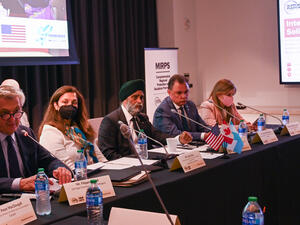'Growing hopelessness' grips 'forgotten' Somali refugees, warns UNHCR
'Growing hopelessness' grips 'forgotten' Somali refugees, warns UNHCR

UNHCR Special Envoy Mohamed Abdi Affey (standing) listens to a Somali refugee in Dadaab, Kenya, who has opted to return home under a voluntary repatriation programme.
GENEVA – Nearly one million Somalis in refugee camps in the Horn of Africa and the surrounding region face growing hopelessness as their displacement drags on for decades and donors become fatigued, a senior representative with UNHCR, the UN Refugee Agency, has warned.
“There is a growing sense of hopelessness in the camps, because people are feeling forgotten,” said Mohamed Abdi Affey, UNHCR’s Special Envoy on the Somali refugee situation.
The Somali refugee situation, now in its third decade, is among the most protracted in the world, with a third generation of refugees being born in exile. Nearly one million Somalis are displaced in the near region, and a further 1.1 million are displaced within Somalia itself.
Affey was speaking in Geneva after going to Somalia and visiting refugee camps in Djibouti, Kenya, Ethiopia and Uganda, where 905,060 Somali refugees live in a drawn out exile, some since the 1990s. Last month, he visited Yemen, where he witnessed the increasingly desperate conditions facing refugees in the war-torn country.
"Desperation is setting in and people are becoming angry.”
The Special Envoy said donor attention was drawn to other emergencies including Syria and South Sudan.
“There’s dwindling attention … because of the fact that it is protracted. The world is focused elsewhere, forgetting a very critical population,” he said.
“Meanwhile hunger is growing, meanwhile frustration is growing, meanwhile desperation is setting in and people are becoming angry.”
As the situation draws on for decades, Affey said that refugees in the camps faced challenges ranging from dwindling food rations as a drought builds in East Africa to limited access to education and skills training, particularly for the youth.
“Refugees should be skilled enough, trained to prepare them for an eventual return so that they can participate in the reconstruction of their country. So that they don’t go back after 30 years, without skills, within the camps we must create these conditions and possibilities.”

After spending six years in Dadaab, Somali refugee Amal has decided to return to Somalia with her three-year-old twins Fawzan and Furad.
Since UNHCR started supporting voluntary return of Somali refugees in Kenya in 2014, a total of 39,316 have returned to their country.
While acknowledging that security and socio-economic conditions in many parts of Somalia are not right for large-scale returns, Affey appealed to the international community to redouble efforts to bring stability to the country which has seen nearly two-and-a-half decades of armed conflict.
“There has been some real progress in Somalia over the past few months, including the successful organization of elections inside the country. What’s needed now is to build up infrastructures across the country so refugees do not suffer when they go back,” said Affey, who previously served as the Deputy Foreign Affairs Minister in Kenya.
“Nobody wants to be a refugee for ever,”
To rally international support for Somali refugees, UNHCR is backing a regional summit which will be led by the Intergovernmental Authority on Development in Eastern Africa in March 2017. It aims to identify lasting solutions for Somali refugees.
“Nobody wants to be a refugee for ever,” said Affey. “A regional solution is the most viable solution for the Somali situation.”
A regional response will include providing continued protection to 262,000 Somali refugees in Dadaab refugee camp complex in north-east Kenya which has been hosting people fleeing violence in neighbouring Somalia for more than two decades.
Following the Government of Kenya’s decision in 2016 to close Dadaab Camp, UNHCR presented a plan of action at the meeting of the Tripartite Commission - comprising Kenya, Somalia and UNHCR - and an agreement was reached with the Kenyan government to delay the closure.
UNHCR reiterated its continued commitment to supporting the Kenyan government in its protection of Somali refugees while exploring options for durable solutions to end the refugees’ protracted displacement, including voluntary repatriation to Somalia.








